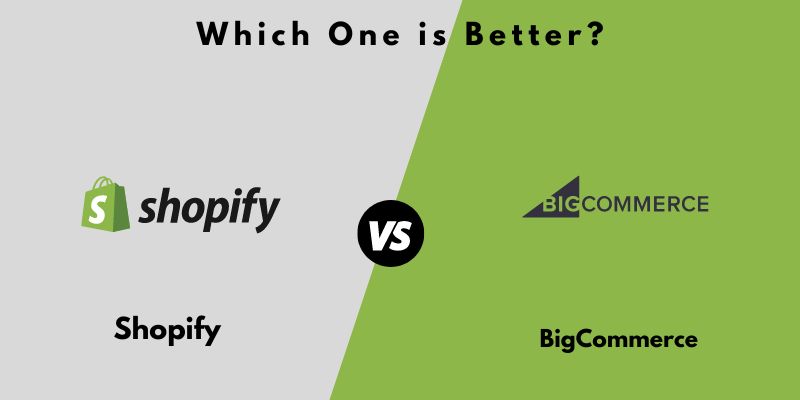
Shopify vs BigCommerce: Which is Better?
Numerous e-commerce platforms are released yearly, yet industry leaders such as Shopify vs BigCommerce continue to dominate. Finding the best choice for your business can be intimidating because each platform has advantages and disadvantages.
Fully conscious of this, I have thoroughly investigated and published this comparison between BigCommerce and Shopify. Below are some of the main points to remember:
- Which is superior: Shopify or BigCommerce? It exists. Shopify excels in user-friendliness, themes & aesthetics, app selection, and dropshipping capabilities.
- Which is superior, BigCommerce or Shopify? Even though BigCommerce stands out in built-in sales & marketing features and payment gateways, Shopify remains the top winner.
- Shopify and BigCommerce are equal in pricing systems, security, and support.
Continue reading for additional details. An in-depth comparison of Shopify versus BigCommerce is just a quick scroll away!
2. BigCommerce emerges victorious in terms of pricing and costs.
In our study, we found that both Shopify and BigCommerce provide free trial options in their pricing plans. Their price options range from approximately $19 to $299.
On the other hand, the contrast in pricing between BigCommerce and Shopify is mainly determined by the variety of features included in each package. In the Basic Plan, Shopify provides the abandoned cart recovery feature, whereas BigCommerce reserves it for the Plus Plan.
BigCommerce pricing for online shopping.
At the moment of writing, there are 4 different BigCommerce pricing plans available.
- Monthly fee is $29.
- Costs $79 per month.
- Price: $299 per month.
- Business: pricing tailored to specific needs.
I was surprised to learn that BigCommerce does not charge any transaction fees on any of their plans. This implies that companies can maximize their sales without having to be concerned about extra expenses or penalties.
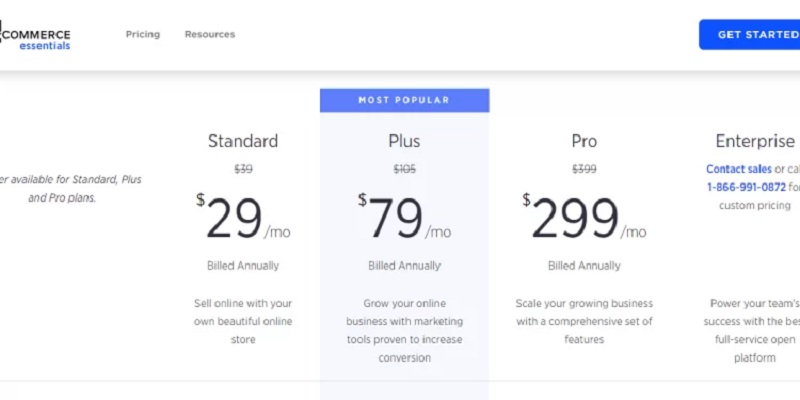
Pricing with Shopify eCommerce
Similarly, Shopify provides four pricing tiers:
- Basic: $19 per month.
- Shopify: $49.00 per month.
- Shopify Advanced: $299 per month.
- Shopify Plus: Depending on your needs, it starts at $2,300.
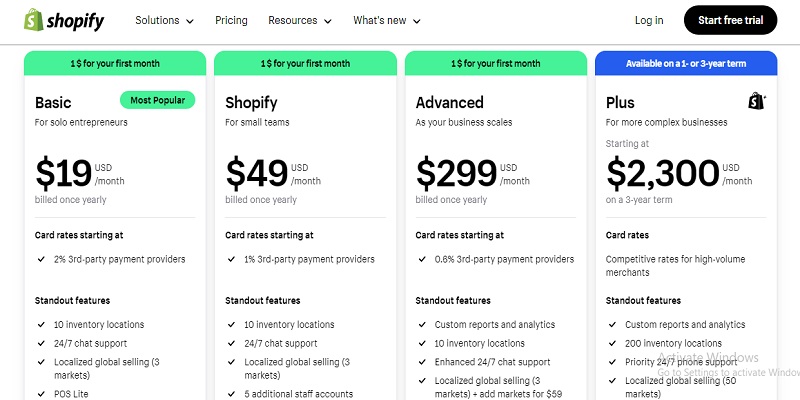
Furthermore, Shopify offers an enterprise version known as Shopify Plus. LitExtension has put out a thorough comparison between BigCommerce and Shopify Plus; for further details, be sure to read this post.
The Verdict
I think BigCommerce wins in terms of price when compared to Shopify. Transaction costs, staff accounts, product variations, bandwidth, and limitless file storage are all free. There will be extra transaction costs with Shopify, and the Advanced Plan will only allow for 15 staff accounts.
2. Usability — Shopify Wins
The simplicity of use is crucial for both novice and seasoned eCommerce business owners. As a result, we highly advise taking it into account when contrasting Shopify with BigCommerce.
BigCommerce’s user-friendliness
BigCommerce has always catered to website owners with minimum website setup skills since its launch. Still, it’s flexible enough for developers and power users to change the code in shops! Therefore, BigCommerce is the solution you will pick regardless of whether you want to start from scratch or dive into the codes.
Naturally, it might take some time for you to begin developing your business and comprehend how the platform functions. However, you may expand your business by enabling your store with innovative features.
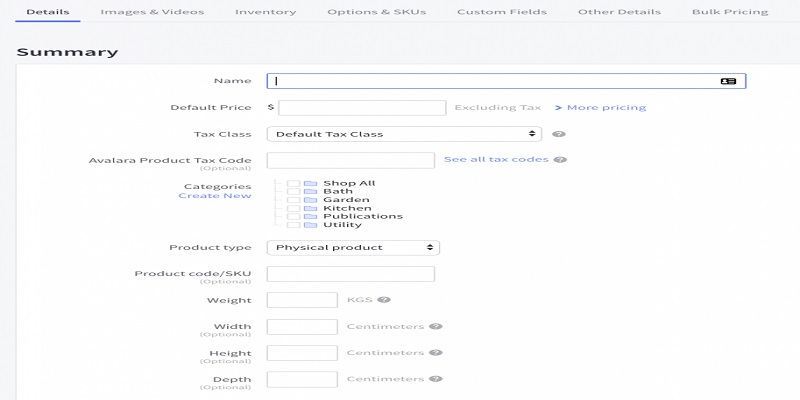
Shopify’s user-friendly interface
The good news is that Shopify’s simple and intuitive dashboard makes it incredibly straightforward to set up a new store! To begin modifying the many parts that Shopify has previously created for its users, simply adhere to the in-app instructions. You may concentrate on developing your business strategy by not having to become overly involved in the technical side of things.
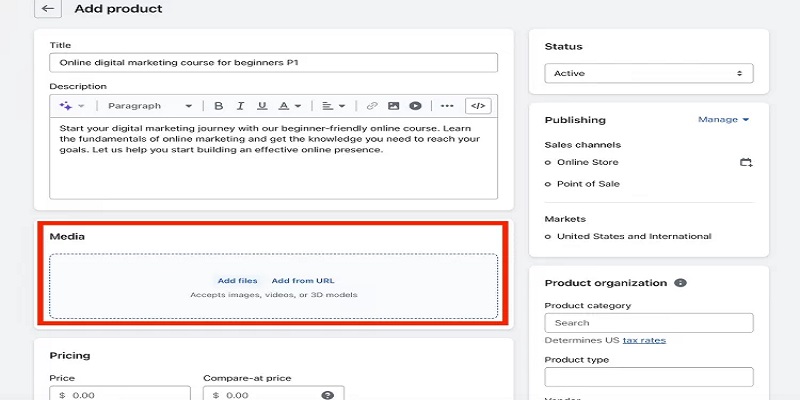
The Verdict
To be honest, Shopify has a better usability rating than BigCommerce. Shopify’s user-friendly editor and onboarding procedure are highly praised by most users. The main menu on the left provides access to all the options you want, and a helpful wizard walks you through setting up your business step-by-step.
3. Shopify wins in Themes and Design
Naturally, you also want the business to have a façade that is visually appealing enough to draw in people and encourage purchases. This is how BigCommerce vs. Shopify’s shop design options appear.
BigCommerce Theme
On the official theme shop, this eCommerce platform provides 196 distinct themes arranged by price, layout, and industry. Though there aren’t as many industries as Shopify, there is still a good selection.
Furthermore, BigCommerce themes that range in price from $150 to $399 are available for free, making them excellent choices for novices. on further ideas if you’re at a loss on where to begin, check out the top BigCommerce themes.

Shopify Themes
There are 212 themes available for various sectors and styles on the Shopify theme shop, with prices ranging from $100 to $350.
Finding the ideal theme is simple when you search by layout, store size, industry, navigation style, and other factors. Shopify offers a range of modern and professional themes, both for free and for a fee. Even better, Shopify’s themes are incredibly customizable since they are simple to edit.

The finest feature is that every theme from Shopify is adaptable to mobile devices and will adjust its layout to match the screen size accordingly. To ensure that your website appears fantastic on all devices, you may also make any changes you like to both versions. In the example, Shopify even permits a mobile preview.
The Verdict
Shopify defeats BigCommerce in terms of themes and designs because of its assortment of contemporary, mobile-friendly themes. Not to add, it provides the greatest value for both paid and free choices.
4. Shopify wins in apps and extensions
Having a platform that is adaptable and configurable and can grow with your needs is crucial for eCommerce businesses as they expand. This section compares Shopify vs BigCommerce’s app marketplace and scalability features. Keep in mind that certain apps are accessible for Shopify and BigCommerce.
Apps for BigCommerce
You may make use of more than 1500 applications in many categories, such as Accounting & Tax, Checkout, Payment & Security, etc. when you use BigCommerce. To assist consumers in selecting the best BigCommerce applications for their companies, we have included an informed overview of the best apps available here.
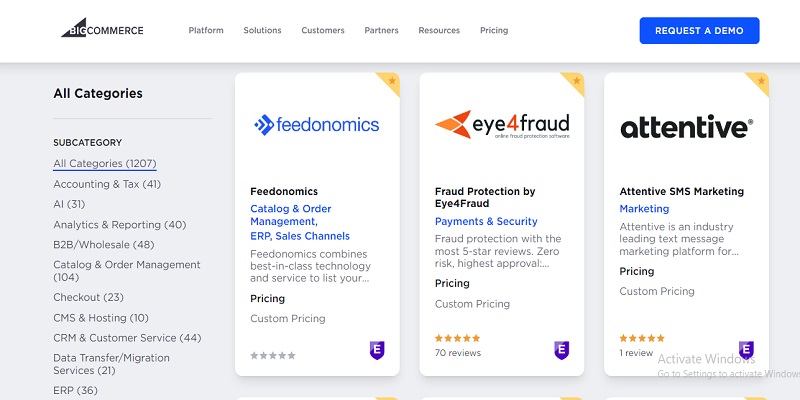
Moreover, BigCommerce comes with some really strong built-in capabilities that cut down on the resources needed to operate third-party apps. While all subscriptions provide 99.99% uptime and open APIs, the Enterprise Plan offers an infinite number of API calls along with a headless solution. BigCommerce’s partnership with sellers and developers makes it possible for them to excel in the eCommerce space.
BigCommerce is the most scalable platform primarily because of its strong connectivity with Google products, multi-storefront capability, and bespoke consulting management.
Shopify Applications
The 8,000+ apps in the official Shopify app shop will blow you away—it’s the largest app store available!

Furthermore, you can conveniently browse through trending apps, new and noteworthy apps, top new apps, and similar options. An alternative method is to investigate other categories for additional shipping and delivery apps, customization tools, or marketing options. Select the top Shopify apps for your store at this moment.
Shopify created Shopify Plus for global-focused stores, in addition to their standard plans. It provides more advanced features and tools that exceed what is offered on the regular Shopify platform. These capabilities consist of multi-channel selling, global expansion, and advanced security measures.
The Verdict
In my opinion, Shopify is much more advantageous for sellers or individuals looking to expand their business. It provides endless opportunities for creating, evolving, and expanding with the flexibility and convenience of an open SaaS platform.
5. BigCommerce Wins in Payment Gateways
It is clear from comparing Shopify vs BigCommerce that both systems are compatible with practically all third-party gateways, including Square, Paypal, and Stripe. But the thing that separates Shopify from BigCommerce is that Shopify has an integrated payment processor. In the meantime, vendors may incorporate third-party apps with additional useful features thanks to BigCommerce.
Shopify Payments
Just so you know, Shopify Payments is the in-house payment processor exclusively for Shopify businesses. Shopify Payment receives consumer payments and transfers them straight to the owners of the stores whenever a transaction is done. In addition, it has a fraud analysis built-in to find any unusual activity.

Shopify Payments makes sure that transactions between customers and sellers happen quickly, easily, and securely on Shopify. In addition, I was quite delighted by the following benefits of Shopify Payment:
- Setup and approval happen instantly.
- Complete incorporation.
- No additional or unstated costs for transactions.
Shopify still offers support for more than 100 third-party payment gateways depending on the region of your shop, in addition to Shopify Payments. However, depending on your monthly plan, there is a transaction charge that can be anywhere between 0.5% and 2%. This transaction cost only goes down if you select Shopify’s higher-tier plans.
Payments on BigCommerce platform
BigCommerce provides 65+ payment gateway integrations (in addition to 250 local payment methods) across more than 100 countries, whereas Shopify does not offer as many. Examples include Amazon Pay, Paypal, Square, Stripe, Authorize.net, Bolt, and others. They also offer fantastic features.
- There is no transaction fee for any third-party provider on BigCommerce.
- Adhering to PCI regulations.
- Optimized for mobile devices.
Another incredible feature of the BigCommerce portfolio is its ability to operate in multiple currencies, solidifying its position as a top open SaaS platform. This functionality enables you to modify pricing in pricing lists at a more detailed SKU level, a capability not offered by other market leaders, including Shopify.
Furthermore, BigCommerce customers have the freedom to choose any payment provider they prefer. This design stands out from other tools because it often requires owners to utilize the built-in payment method for multi-currency tools!
Here is our visual representation addressing the inquiry, “What is the payment processing method utilized by BigCommerce?”
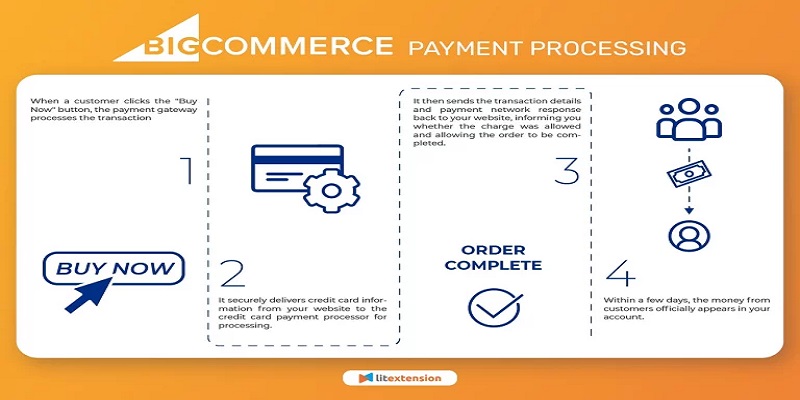
The Verdict
When it comes to payment gateways, BigCommerce is our favorite. The main justification for this claim is the absence of any transaction fees while maintaining connectivity to well-known suppliers. It may save us, the internet retailers, a ton of cash!
6. Shopify emerges as the winner in the field of eCommerce dropshipping.
For drop shippers, the key is sourcing products efficiently and easily from suppliers. Only after that can they include those items in their shops and automate the sales and shipping process! That is the reason I chose to incorporate this aspect into my comparison of BigCommerce and Shopify. While both apps allow you to complete tasks from beginning to end, there is a small variance in their quality.
Using a dropshipping model on the Shopify platform.
Shopify’s main feature for drop shippers, in our opinion, is its collaboration with Dsers and Dropified.
Users are the top providers of a wide range of products at discounted prices. Furthermore, apart from Dsers, there are numerous comparable applications offered on the Shopify app market that cater to various niches, markets, or regions. Because of Shopify’s strict curation standards, most of their products are highly rated and excel in their offerings.

BigCommerce dropshipping
Similar to Shopify, BigCommerce boasts a respectable app store with plenty of excellent product-sourcing apps. But to be honest, some of BigCommerce’s other applications aren’t quite as complete as Dsers, and their quality varies accordingly.
The Verdict
Shopify seems to have a little edge over dropshipping because of its extensive selection of specialized applications and good ties with suppliers. Nevertheless, BigCommerce offers several third-party connections to help online retailers.
7. Sales characteristics – A draw
It goes without saying that sales features are essential for every online seller; they determine if you can increase sales on the platform. Luckily, both BigCommerce and Shopify have improved in this area, but we need to examine the specifics further.
Managing Inventory
BigCommerce provides an uncomplicated, built-in, and effective system for handling stock levels and order trends. It ensures that inventory remains accurate by integrating online and offline channels smoothly. Additionally, the existing features on BigCommerce alone enable us to sell physical, digital, and service-oriented items without the need for additional apps.
Shopify: The inventory section of Shopify allows you to establish inventory monitoring, check your inventory, and modify your inventory quantities. It also allows us to see the historical record of inventory modifications for different product variations.
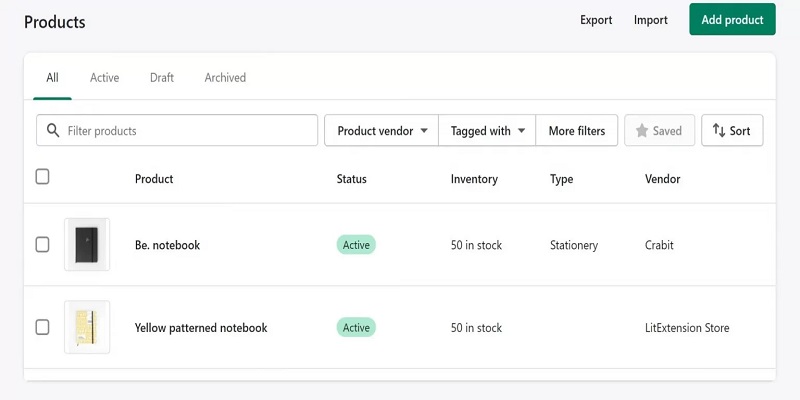
Channels for selling products.
BigCommerce: Channel Manager aims to assist merchants in increasing sales by simplifying multi-channel selling. It was simple for me to link my store with sales channels and start selling on different marketplaces (such as eBay, Amazon, Walmart, and others), as well as on social channels (such as Facebook, Google, and so on).
Shopify: Sell your products on various online sales channels using Shopify. By linking every sales platform to Shopify, we were able to monitor all the products, orders, and customers from a single location. Additionally, Shopify offers support for a variety of online sales platforms, including Facebook, Amazon, eBay, Instagram, and more.
Point-of-purchase (POP)
BigCommerce: It allows you to easily integrate with various POS providers (such as ConnectPOS, Hike, Vend, etc.) for a seamless online and offline selling experience. It assists in overseeing product catalogs in a centralized manner and synchronizing inventory across all locations. And there are no extra charges for any of this!
Shopify POS: It offers a mobile app on IOS and Android for a point-of-sale system that can be accessed directly through Shopify. This can be utilized for selling your products face-to-face. Please take a moment to read this comprehensive review of Shopify POS to gain a better understanding of this tool!

The Verdict
These are both wise choices. For businesses with intricate omnichannel requirements, BigCommerce may have a slight advantage due to its natively integrated sales functionality across channels and POS systems. In the meantime, Shopify excels at handling inventory and sales across several channels.
8. Marketing Attributes: Shopify Wins
Promoting your business may be facilitated by using marketing tools and functions! Now let’s compare the marketing features of BigCommerce vs Shopify.
BigCommerce Advertising
Using email marketing to reach out to consumers is a good way to help promote items quickly. As a result, BigCommerce enables data syncing with popular email providers like G Suite and MailChimp.
Let’s move on to the topic of Shopify SEO versus BigCommerce. Based on my observations, BigCommerce guarantees industry-standard SEO, which is integrated into every BigCommerce website. The fact that we have complete control over metadata, header tags, title tags, and URLs is the nicest part. Furthermore, BigCommerce automatically generates 301 redirects if the name or URL of a product, category, or webpage is changed.
Note: We suggest incorporating helpful marketing tools to broaden your capabilities. For example, integrating BigCommerce data with a tool such as MailChimp enables greater freedom in email layout design!
Promotion of Shopify Products and Services
In our experience, Shopify email effectively offers built-in tools for cultivating long-term customer relationships. This platform offers premade templates that you can select and use immediately. We can also handle and assess all marketing tasks on your dashboard.
And that is just the beginning. Shopify’s SEO aids in on-page optimization through personalized title tags and meta description setups. It is utilized on a simple interface within each product and page editor. Creating a 301 redirect in Shopify is simple and it will automatically notify if a page or product URL is modified.
The Verdict
BigCommerce and Shopify both come equipped with a built-in blog, a crucial and highly efficient tool for content marketing. Nevertheless, Shopify provides additional features for merchants to enhance their websites for better visibility on search engines.
9. Security is at a draw.
Ensuring security for an e-commerce website is crucial, especially in terms of safeguarding data and maintaining sensitivity. It is only when you implement the correct security measures for your website that you can guarantee the privacy and integrity of customers. Let’s see how BigCommerce compares to Shopify in this particular aspect.
Security measures in BigCommerce.
BigCommerce’s approach to security is thorough and leaves nothing to be desired.
BigCommerce offers robust security measures for all websites they host as a Software as a Service (SaaS) provider. Every server has been certified as PCI DSS level 1 to prevent credit card data breaches. Extra security measures involve firewalls around the perimeter and on individual servers, tools that scan for file integrity, software that detects intrusions, continuous human monitoring, and safeguards against fraudulent transactions.
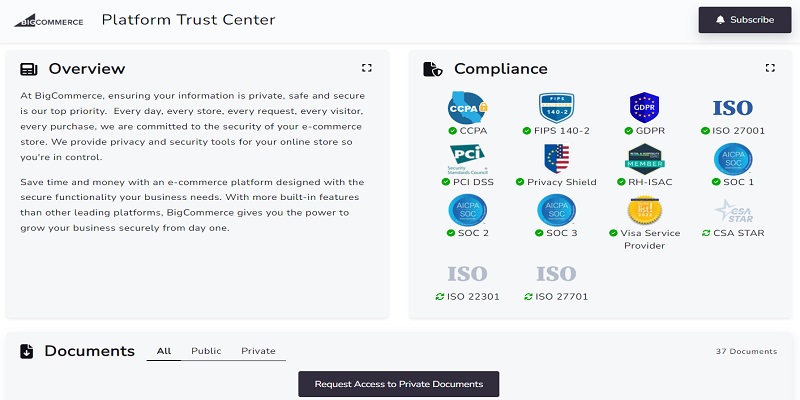
Furthermore, you have the option to utilize an SSL certificate provided by an authorized third party for a particular domain or subdomain. It confirms that a secure website has been effectively encrypted, guaranteeing the privacy of any data exchanged between a user and the website.
Security of Shopify
In the same way, Shopify ensures that all of its stores are automatically PCI compliant to maintain the security of your business and customers. Therefore, you can ensure the safety of payment information and business data. Additionally, Shopify offers SSL certificates once a custom domain is added. SSL certificates enhance security by encrypting your store’s content and securely delivering it over HTTPS instead of HTTP.
The Verdict
I believe that BigCommerce and Shopify are similarly secure. Both platforms prioritize security and offer multiple layers of protection that should meet the needs of most small to mid-sized eCommerce businesses.
10. BigCommerce excels in customer service.
To maximize your eCommerce store-building experience, you must not only focus on pricing plans. Having tech support available is essential for every business. You never know what type of issue you may encounter.
Therefore, in this part, we will examine the customer support services offered by BigCommerce compared to Shopify.
Support provided by BigCommerce
My experience with BigCommerce support has been positive recently, so I think you’ll have a good experience as well. After registering for a BigCommerce trial, you will be scheduled for a 10-minute call with the platform. Through this process, BigCommerce can gain insight into your business, resulting in more tailored advice.
Furthermore, BigCommerce places a high emphasis on customers who sign up for the enterprise-level plan. You will have access to onboarding consultants and phone support from very talented BigCommerce employees.

Shopify Assistance
Shopify, like BigCommerce, does an excellent job of segmenting out certain areas for customer assistance!
Furthermore, Shopify customer care provides assistance via social media in addition to standard customer support, much like any other eCommerce platform. You will be sent to an appropriate page in the Shopify knowledge center when you submit a support request using the Shopify editor. This is a really helpful feature that distinguishes Shopify from BigCommerce.
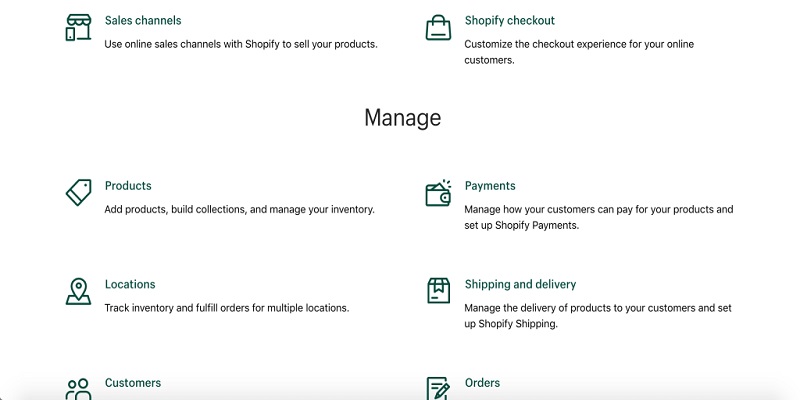
The Verdict
Compared to Shopify’s, BigCommerce’s support center is more lucid yet still helpful. It could have a little edge due to its more organized help center and in-app instructions, which make it simpler for Shopify businesses to handle support-related concerns.
Our Approach
As previously stated, determining the superior platform between Shopify and BigCommerce is a challenging task. As a result, I have dedicated more than three months to experimenting with both platforms, rigorously evaluating them, and creating this comparison.
These are the criteria I use for ranking, along with the weight given to each based on their significance to our audience.
1. Sales and marketing components account for 35% of the total.
In this evaluation, I assess the built-in capabilities of each platform to determine its effectiveness in supporting merchants with online sales. Before making a decision, I take into account functions such as abandoned cart recovery, discount codes, and multi-channel selling capabilities.
2. Themes and the ability to customize makeup 20% of the overall characteristics.
I assess the choice of themes, their user-friendliness, and the extent of customization available. This assists in identifying which platform provides a more intuitive user experience for developing a distinct and visually attractive online image that matches your brand’s identity.
3. User-friendliness accounts for 15% of the overall experience.
I think this is a crucial element to consider when comparing BigCommerce and Shopify as it has a direct effect on user experience, efficiency, and overall satisfaction. I aim to ensure that the platforms are suitable for users with different levels of technical expertise by assessing this aspect.
4. Applications and add-ons – 10%
Even if a platform is full of features, having a strong selection of apps and extensions can improve a business’s capabilities. Hence, in the decision-making process between BigCommerce and Shopify, I consider the range of apps and extensions to determine the platform’s flexibility and how well it can meet your individual business requirements.
5. Safety measures account for a 10% portion of the overall security measures.
Carefully evaluating the security measures of the platform ensures the protection of customers’ confidential data. This involves assessing data encryption protocols, access control procedures, and the platform’s track record of security incidents.
6. Support provided to customers – 5%
An effective customer support system is essential for addressing user concerns throughout the sales process. This is the reason why I consider customer support when comparing Shopify and BigCommerce. This encompasses the accessibility of support options (phone, email, live chat, etc.), the platform’s information repository, and the proficiency of their support staff.
7. Review from a user – 5%
I think that users are the ones who understand a platform the most. Therefore, in addition to analyzing BigCommerce and Shopify, I also review customer feedback on other external platforms (such as Capterra, Trustpilot, etc.) to gauge merchants’ opinions.
FAQs: BigCommerceI vs. Shopify
Which is superior BigCommerce or Shopify?
The decision between BigCommerce and Shopify ultimately comes down to certain business needs. Shopify is a good option for people who value flexibility and simplicity of use because it is often regarded as being more user-friendly and has a larger app ecosystem.
However, BigCommerce is well-regarded for its versatility and built-in functionality, which makes it a good option for companies with sophisticated requirements or pre-existing IT infrastructure.
Should I move to Shopify instead of BigCommerce?
You should think about things like cost and difficulty of use, features provided, and app integrations before opting to go from BigCommerce to Shopify. Switching to Shopify might be beneficial if it better fits your company’s objectives, has more functionality, and has an easier-to-use interface.
You will receive comprehensive assistance from our BigCommerce to Shopify migration guides!
What are BigCommerce’s shortcomings?
BigCommerce is a powerful eCommerce platform, but it is not without flaws. In comparison to Shopify, users have reported a steeper learning curve, and the platform can be seen as less user-friendly for beginners.
While expanding, the app ecosystem could not be as large as Shopify’s, and certain sophisticated capabilities might be more expensive.
BigCommerce works best for who?
For small to medium-sized enterprises, BigCommerce works well. The platform can be scaled to accommodate different business sizes and includes built-in functionality and customization choices. Its applicability may be ascertained by analyzing the unique needs of your small business and contrasting them with the features provided by BigCommerce.
On my list of the top eCommerce platforms, BigCommerce and Shopify are both top-notch site builders.
Conclusion
Even though Shopify came out on top, your company’s strategy is still the most important factor here! BigCommerce is the best option if you want to experience great built-in marketing capabilities at a lower cost. Shopify is going to be the finest option for anyone who desires easy, total control over the eCommerce functionality and themes for their business.
Additionally, LitExtension, the #1 eCommerce Migration Expert team, is ready to help if you intend to move your platforms to Shopify or BigCommerce. With over 300,000 successful migrations for over 200,000 global clients over the last 13 years, our team provides the best migration solution in the world. For the best help, don’t be afraid to get in touch with our support staff.
You can also check our related articles: